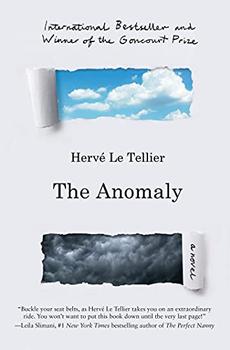Summary | Excerpt | Reviews | Beyond the Book | Readalikes | Genres & Themes | Author Bio

A Novel
by Hervé Le TellierCHAPTER ONE
As Black as the Sky
(MARCH–JUNE 2021)
BLAKE
It's not the killing, that's not the thing. Gotta watch, monitor, think, a lot, and—come the time—carve into the void. That's it. Carve into the void. Find a way to make the universe shrink, to make it shrink till it's condensed into the barrel of the gun or the point of the knife. That's all. Don't ask any questions, don't be driven by anger, choose the protocol, and proceed methodically. Blake can do all that, and he's been doing it so long he can't remember when he started. Once you have it, the rest just falls into place.
Blake builds his life on other people's deaths. No moralizing, please. If anyone wants to talk ethics, he's happy to reply with statistics. Because—and Blake apologizes—when a health minister makes cuts in the budget, culling a scanner here, a doctor there, and an ICU bed somewhere else, that minister knows that he or she's appreciably shortening the lives of thousands of strangers. Responsible but not answerable, we've all heard that tune. With Blake it's the other way around. And anyway, he doesn't need to justify himself, he couldn't give a damn.
Killing isn't a vocation, it's a leaning. A state of mind, if that makes more sense. Blake is eleven years old, and his name isn't Blake. He's in the Peugeot with his mother on a minor route near Bordeaux. They're not traveling especially fast, a dog crosses the road, the impact barely alters their course, his mother screams, brakes, too hard, the car zigzags, and the engine stalls. Stay in the car, honey, my God, you be sure to stay in the car. Blake doesn't do as he's told, he follows his mother. It's a gray collie, the collision has crushed its chest, blood is oozing onto the tufts of grass by the roadside, but the dog isn't dead, it whimpers, sounding like a mewling baby. Blake's mother runs in every direction, panicking, she covers
Blake's eyes with her hand, stammers incoherently, she wants to call an ambulance, But, Mom, it's a mutt, it's just a mutt. The collie sputters on the fissured asphalt, its broken, twisted body contorts at a strange angle, wracked with gradually diminishing twitches, dying right in front of Blake's eyes, and Blake watches inquisitively as the life drains out of the animal. It's over. The boy puts on a cursory show of sadness, well, what he imagines sadness is, to avoid disconcerting his mother, but he feels nothing. His mother stays by the little body, frozen to the spot, Blake's had enough, he pulls at her sleeve, Come on, Mom, there's no point staying here, he's dead, let's go, I'm gonna be late for the game.
Killing is also about skill. Blake finds that he has all the requirements the day his uncle Charles takes him hunting. Three shots, three hares, a kind of gift. He aims swiftly and accurately, he can adapt to the crummiest old rifles, the most misaligned shotguns. Girls drag him to fairgrounds, Hey, please, I want the giraffe, the elephant, the Game Boy, yes, go on, again! And Blake hands out soft toys and games consoles, he becomes the dread of shooting galleries, before opting for a little more discretion. Blake also enjoys the things Uncle Charles teaches him, gutting deer and jointing rabbits. Let's be clear on this: he derives no pleasure from killing, from finishing off an injured animal. He's not depraved. No, what he likes is the specialized action, the fail-safe routine that gels with frequent repetition.
Blake is twenty, and using his oh-so French name—Lipowski, Farsati, or Martin—he's enrolled at a hospitality school in a small town in the Alps. Don't go thinking there were no other options, he could have done anything, he was keen on electronics too, programming, he was a gifted linguist, take English, for example, all it took was a three-month course at Lang's in London and he could speak it almost without an accent. But what Blake likes more than anything else is cooking, because of those idle moments spent writing a recipe, the time that trickles slowly by, even in the feverish activity of a kitchen, and the long, unhurried seconds spent watching butter melt in the pan, white onions reduce, a soufflé rise. He likes the smells and the spices, enjoys arranging combinations of colors and flavors on a plate. He could have been the most brilliant student at hotel school, but Seriously, fuck, Lipowski (or Farsati or Martin), if only you could show some courtesy to the clientele, it wouldn't do any harm. This is a service industry, service, do you understand, Lipowski (or Farsati or Martin)?
Originally published in French as L'Anomalie in 2020 by Éditions Gallimard, Paris
Copyright ©2020 Éditions Gallimard
English translation copyright ©2021 Other Press




When an old man dies, a library burns to the ground.
Click Here to find out who said this, as well as discovering other famous literary quotes!
Your guide toexceptional books
BookBrowse seeks out and recommends the best in contemporary fiction and nonfiction—books that not only engage and entertain but also deepen our understanding of ourselves and the world around us.